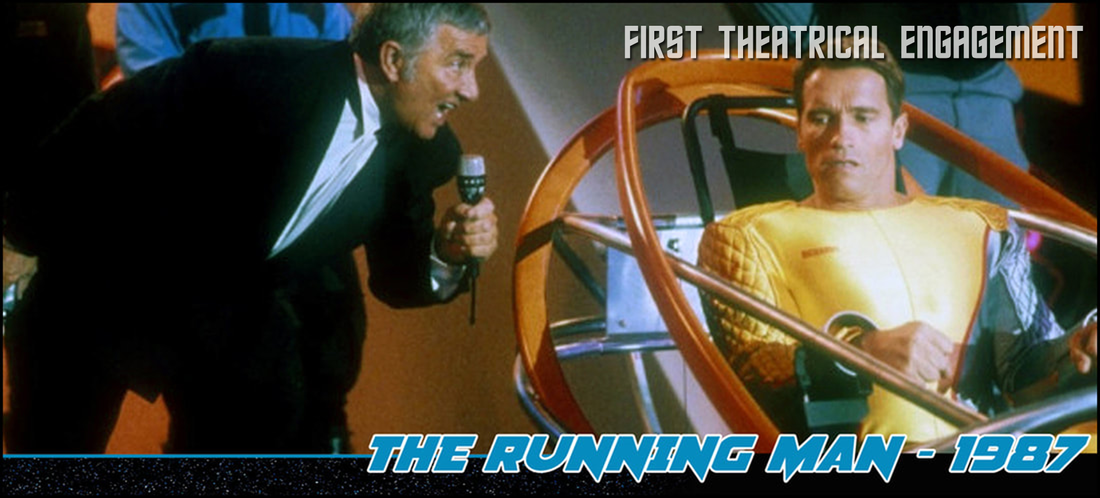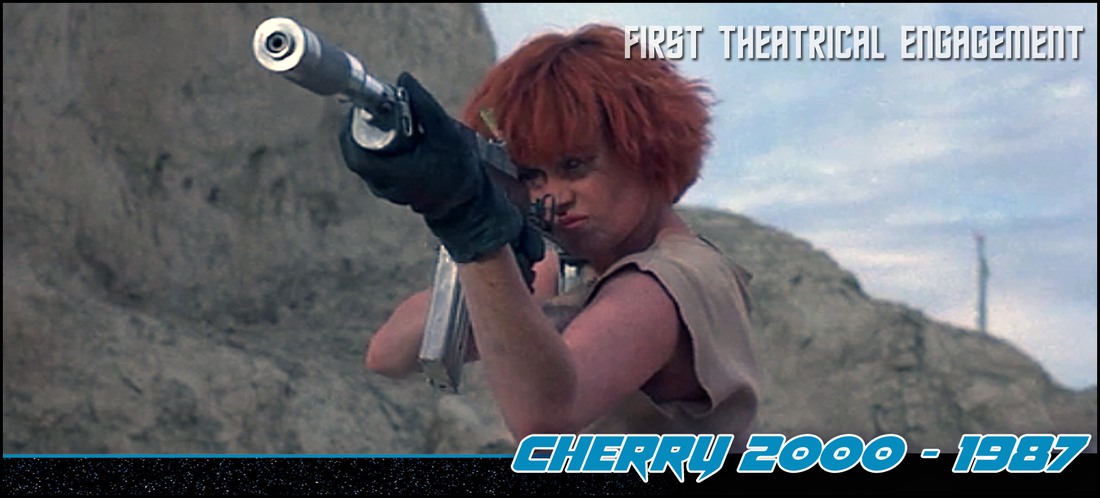The dirty little secret about Science Fiction films? They've always been commentaries on the state of our world.
In some ways, we -- as a species -- like to think that we're better than we are. We like to think that we don't lie and cheat or engage in all kinds of borderline nefarious behaviors, but we do. In fact, there could be no drama in our lives -- both that we lives and what we see on the big or small screen -- if there were no conflict, and so very much of conflict revolves around what we might classify as 'bad behavior.' We have always been about pursuing something greater than we are, and we probably always will be. It's just how we're wired.
Naturally, this doesn't mean that everything we do is tainted, though I could make an argument for that as well. Flawed people created flawed things, and these flaws will forever plague us in our pursuit to craft the perfect product, the perfect event, the perfect being, even the perfect experience ... and that experience is what drives so much of The Running Man's commentary.
This particular pursuit of trying to find 'the best' details Ben Richards (as played by Arnold Schwarzenegger) and his attempt to put his life back together after refusing (as a police officer) to endanger the lives of those he had been tasked to protect. In this grim tomorrow, society has reverted back to watching gladiatorial-style games, the ultimate one being 'The Running Man,' a show that pits convicts against one another in the quest to survive. But -- in order to do so -- one must outlast some of the bloodiest methods of execution ever broadcast on television.
Clearly, the film is making a statement about us in ways we don't often like to acknowledge. While it's obviously poking fun at television's never-ending quest to garner the highest ratings, Man is also indicted the culture that supports the ritual blood lust associated to violent confrontations. Just like we can't help ourselves but slow down to look over at the accidents on the side of the freeway -- perhaps secretly hoping we see something no person should have to -- we cheer and root for our victors to vanquish our enemies, and we're often very accepting of the most violent coup de grace possible.
Indeed, isn't that why a muscular strongman the likes of Arnold Schwarzenegger would be catapulted to the likes of a major action star? After all, Humphrey Bogart wouldn't have done a role like this, and neither would Gregory Peck. But scripts like The Running Man are perfectly crafted for Arnold aesthetically. He's the ultimate action figure brought to life, so he must be provided with an equally imposing storyline. He is who audiences aspire to be in conflicts like those portrayed in this film, so let it be said that he's perfectly cast.
Interestingly enough, the film really only performed on average as par with other Science Fiction gems 'the Arnold' has been part of. His work in the Terminator franchise boasts far more successful box office receipts, and many would argue that 1990's Total Recall is perhaps the actor's highwater mark in film. Predator also opened in 1987 (in the summer with The Running Man coming in the late fall), so perhaps audiences were suffering from a case of Arnold overload and, thus, stayed away from the flick. It was still mildly successful, true; but I suspect it didn't gross what those involved thought it could.
The film is fondly remembered by the audience who embraced it, and Man even received some praise back in 2017 (upon its thirtieth anniversary) for correctly predicting the state of the world in which we live. (If you're interested in knowing more about that, simply head on over to the feature's Wikipedia.org entry for details.) I found it largely forgettable, almost to the point of suggesting that were Schwarzenegger not involved with it who knows whether or not it would be even on anyone's radar three decades later. It's entirely predictable, shackled with a barely obligatory romance (the beautiful Maria Conchita Alonso deserved better), and plays out in high camp fashion so often that there's never any true sense of dread. It's a film I hoped to like but didn't ... and not the first.
As to its central cynicism about our world?
Meh. That kind of thing had been done before. 1975's Rollerball immediately comes to mind. The Norman Jewison picture is also a bit imperfect -- an occasionally leaden performance by James Caan robs some of the quieter moments of greater impact -- but it said many of the same things more than a decade earlier, and it even went a bit further about indicting our society for relishing bloodshed in a capitalist setting. As I said above, I think we've always been this way, will likely always be this way, and are waiting for the next cinematic incarnation to merely remind us of our cultural shortcomings. But Rollerball shuns camp whereas Running Man embraces it, and that will always make the former the better film in my opinion.
Still, I do 'Celebrate SciFi' around here, so I wanted to offer a few quick thoughts on its anniversary today. As always, thanks for reading ... and live long and prosper!
-- EZ
In some ways, we -- as a species -- like to think that we're better than we are. We like to think that we don't lie and cheat or engage in all kinds of borderline nefarious behaviors, but we do. In fact, there could be no drama in our lives -- both that we lives and what we see on the big or small screen -- if there were no conflict, and so very much of conflict revolves around what we might classify as 'bad behavior.' We have always been about pursuing something greater than we are, and we probably always will be. It's just how we're wired.
Naturally, this doesn't mean that everything we do is tainted, though I could make an argument for that as well. Flawed people created flawed things, and these flaws will forever plague us in our pursuit to craft the perfect product, the perfect event, the perfect being, even the perfect experience ... and that experience is what drives so much of The Running Man's commentary.
This particular pursuit of trying to find 'the best' details Ben Richards (as played by Arnold Schwarzenegger) and his attempt to put his life back together after refusing (as a police officer) to endanger the lives of those he had been tasked to protect. In this grim tomorrow, society has reverted back to watching gladiatorial-style games, the ultimate one being 'The Running Man,' a show that pits convicts against one another in the quest to survive. But -- in order to do so -- one must outlast some of the bloodiest methods of execution ever broadcast on television.
Clearly, the film is making a statement about us in ways we don't often like to acknowledge. While it's obviously poking fun at television's never-ending quest to garner the highest ratings, Man is also indicted the culture that supports the ritual blood lust associated to violent confrontations. Just like we can't help ourselves but slow down to look over at the accidents on the side of the freeway -- perhaps secretly hoping we see something no person should have to -- we cheer and root for our victors to vanquish our enemies, and we're often very accepting of the most violent coup de grace possible.
Indeed, isn't that why a muscular strongman the likes of Arnold Schwarzenegger would be catapulted to the likes of a major action star? After all, Humphrey Bogart wouldn't have done a role like this, and neither would Gregory Peck. But scripts like The Running Man are perfectly crafted for Arnold aesthetically. He's the ultimate action figure brought to life, so he must be provided with an equally imposing storyline. He is who audiences aspire to be in conflicts like those portrayed in this film, so let it be said that he's perfectly cast.
Interestingly enough, the film really only performed on average as par with other Science Fiction gems 'the Arnold' has been part of. His work in the Terminator franchise boasts far more successful box office receipts, and many would argue that 1990's Total Recall is perhaps the actor's highwater mark in film. Predator also opened in 1987 (in the summer with The Running Man coming in the late fall), so perhaps audiences were suffering from a case of Arnold overload and, thus, stayed away from the flick. It was still mildly successful, true; but I suspect it didn't gross what those involved thought it could.
The film is fondly remembered by the audience who embraced it, and Man even received some praise back in 2017 (upon its thirtieth anniversary) for correctly predicting the state of the world in which we live. (If you're interested in knowing more about that, simply head on over to the feature's Wikipedia.org entry for details.) I found it largely forgettable, almost to the point of suggesting that were Schwarzenegger not involved with it who knows whether or not it would be even on anyone's radar three decades later. It's entirely predictable, shackled with a barely obligatory romance (the beautiful Maria Conchita Alonso deserved better), and plays out in high camp fashion so often that there's never any true sense of dread. It's a film I hoped to like but didn't ... and not the first.
As to its central cynicism about our world?
Meh. That kind of thing had been done before. 1975's Rollerball immediately comes to mind. The Norman Jewison picture is also a bit imperfect -- an occasionally leaden performance by James Caan robs some of the quieter moments of greater impact -- but it said many of the same things more than a decade earlier, and it even went a bit further about indicting our society for relishing bloodshed in a capitalist setting. As I said above, I think we've always been this way, will likely always be this way, and are waiting for the next cinematic incarnation to merely remind us of our cultural shortcomings. But Rollerball shuns camp whereas Running Man embraces it, and that will always make the former the better film in my opinion.
Still, I do 'Celebrate SciFi' around here, so I wanted to offer a few quick thoughts on its anniversary today. As always, thanks for reading ... and live long and prosper!
-- EZ




 RSS Feed
RSS Feed